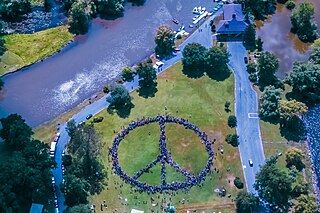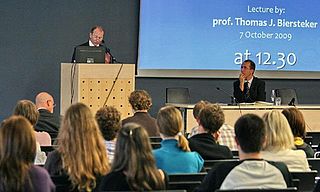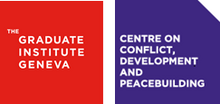
Peace and conflict studies is a social science field that identifies and analyzes violent and nonviolent behaviours as well as the structural mechanisms attending conflicts, with a view towards understanding those processes which lead to a more desirable human condition. A variation on this, peace studies (irenology), is an interdisciplinary effort aiming at the prevention, de-escalation, and solution of conflicts by peaceful means, thereby seeking "victory" for all parties involved in the conflict.
The concepts of security sector governance and reform generally refer to a process in Western-based international development and democratization to amend the security sector of a state towards good governance and its principles, such as freedom of information and the rule of law.
A fragile state is a country characterized by weak state capacity or weak state legitimacy leaving citizens vulnerable to a range of shocks. The World Bank, for example, deems a country to be ‘fragile’ if it (a) is eligible for assistance from the International Development Association (IDA) (b) has had a UN peacekeeping mission in the last three years, and (c) has received a ‘governance’ score of less than 3.2.

Peacebuilding is an activity that aims to resolve injustice in nonviolent ways and to transform the cultural & structural conditions that generate deadly or destructive conflict. It revolves around developing constructive personal, group, and political relationships across ethnic, religious, class, national, and racial boundaries. This process includes violence prevention; conflict management, resolution, or transformation; and post-conflict reconciliation or trauma healing, i.e., before, during, and after any given case of violence.
The Centre for Military, Security and Strategic Studies (CMSS) is an interdisciplinary research centre at the University of Calgary focusing on military, defence and security issues. CMSS has more than 50 students at the Masters and PhD level with 17 senior research fellows, 27 research fellows, 80 alumni and 5 staff members. The CMSS mission is to promote and develop excellence in military, security and defence studies. Erin Gibbs Van Brunschot is the current director of CMSS.
Dr. Curt Gasteyger is the Director of the Association for the Promotion and Study of International Security (APESI), and Honorary Professor at the Graduate Institute of International Studies (HEI), Geneva. He was the Professor for International Relations at the HEI from 1974 to 1994. He was also the founder and director of the Programme for Strategic and International Security Studies.

DCAF- ; Geneva Centre for Security Sector Governance; French: Centre pour la gouvernance du secteur de la sécurité, Genève, German: Das Genfer Zentrum für die Gouvernanz des Sicherheitssektors is an intergovernmental foundation-based think tank that provides research and project support to states and international actors in improving security sector governance and reform.

The Graduate Institute of International and Development Studies, or the Graduate Institute (in French: Institut de hautes études internationales et du développement, abbreviated IHEID is a government-accredited postgraduate institution of higher education located in Geneva, Switzerland.
Mohammed Abu-Nimer is an American expert on conflict resolution and dialogue for peace. He is a full professor at the American University School of International Service in International Peace and Conflict Resolution in Washington, DC, the largest school of international relations in the United States.
Environmental peacebuilding examines and advocates environmental protection and cooperation as a factor in creating more peaceful relations. Peacebuilding is both the theory and practice of identifying the conditions that can lead to a sustainable peace between past, current or potential future adversaries. At the most basic level, warfare devastates ecosystems and the livelihoods of those who depend on natural resources, and the anarchy of conflict situations leads to the uncontrolled, destructive exploitation of natural resources. Preventing these impacts allows for an easier movement to a sustainable peace. From a more positive perspective, environmental cooperation can be one of the places where hostile parties can sustain a dialogue, and sustainable development is a prerequisite for a sustainable peace.
Chandra Lekha Sriram (1971-2018) was Professor of Law at the University of London, School of Oriental and African Studies (SOAS). She has written and lectured widely on conflict prevention, post-conflict peacebuilding, human rights, international criminal law, and transitional justice. Her most recent monograph, Peace as governance: Power-sharing, armed groups, and contemporary peace negotiations (2008), offered a comparative critical examination of the use of power-sharing incentives in peace processes in Colombia, Sri Lanka, and Sudan. Previous monographs on transitional justice and international criminal accountability, Confronting past human rights violations: Justice versus peace in times of transition (2004) and Globalizing Justice for mass atrocities: A revolution in accountability (2005); examined transitional justice and internationalized and externalized criminal justice processes in or for Sierra Leone, Timor-Leste, El Salvador, Honduras, Sri Lanka, South Africa, and Argentina.

Thomas J. Biersteker is an American political scientist and a notable constructivism scholar. He became the first Curt Gasteyger Professor of International Security at the Graduate Institute of International and Development Studies (IHEID) in Geneva, Switzerland in 2007, where he is also a member of the Centre on Conflict, Development and Peacebuilding. He is an active member of the Council on Foreign Relations and the Social Science Research Council and is on the Editorial Board of Stability: International Journal of Security and Development. His more recent work included advising the United Nations’ Secretariat and the governments of Switzerland, Sweden and Germany on the design of targeted sanctions.
Keith Krause is a Canadian political scientist known for his work on international security and armed violence.
European Peacebuilding Liaison Office (EPLO) is the independent civil society platform of European NGOs, NGO networks and think tanks which are committed to peacebuilding, and the prevention of violent conflict.
Center for Justice and Peacebuilding (CJP) is an accredited graduate-level program founded in 1994. It also offers non-credit training. The program specializes in conflict transformation, restorative justice, trauma healing, equitable development, and addressing organizational conflict. CJP is housed at Eastern Mennonite University (EMU) in Harrisonburg, Virginia, which describes itself as "a leader among faith-based universities" in emphasizing "peacebuilding, creation care, experiential learning, and cross-cultural engagement." One of the three 2011 Nobel Peace Laureates, Leymah Gbowee of Liberia, earned a master's degree in conflict transformation from CJP in 2007.

Hizkias Assefa (1948) is a conflict mediator known widely in Africa for his non-aligned work as a consultant who has mediated in most major conflict situations in sub-Saharan Africa in the past 20 years, as well as in a dozen countries elsewhere. He is also a professor of conflict studies. Of Ethiopian origin, he is based in Nairobi, Kenya. He was one of the founding faculty members in 1994 of the Conflict Transformation Program at Eastern Mennonite University.
Rodney Bruce Hall is an American Professor of International Relations and among those scholars known as Second Generation Constructivists. He earned bachelor's and master's degrees in physics and subsequently a master's degree in international relations and a PhD in political science from the University of Pennsylvania under the supervision of Friedrich Kratochwil, one of the founding scholars of constructivism in international relations.

Séverine Autesserre is a French-American author and researcher. She writes about war and peace, peacebuilding, peacekeeping, humanitarian aid, and the ongoing conflict in the Democratic Republic of Congo. Her research has influenced policy interventions as well as scholarly debates on peacebuilding and on Congo. She is a Professor of Political Science at Barnard College, Columbia University, where she specializes in international relations and African studies.
Peacebuilding in Jammu and Kashmir includes confidence-building measures at a nation-state level between the governments of India and Pakistan, track two diplomacy, as well as initiatives by non-governmental organisations (NGOs), institutes and individuals. The purpose of peacebuilding in Jammu and Kashmir include conflict prevention and reduction of hostilities in the Kashmir Valley. Many countries such as Russia, United States and China have also played a deescalatory role with regard to tensions in the region.
Florian Krampe is a German/Swedish political scientist and international relations scholar at the Stockholm International Peace Research Institute (SIPRI).[2] He is best known for his work on the security implications from climate change and the governance of natural resources after armed conflict.







